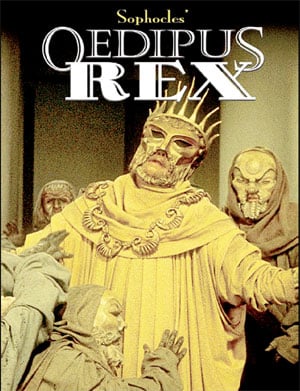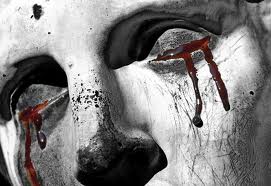Almost everyone has heard the story of Oedipus and knows the tragedy of his life; but do they know what made the story so impactful that it still is performed on stages today? Oedipus’s life brings to question the debate between fate, free will, and how they mix.
This message of misfortune resonates across centuries and around the world, but how does a single plot line ask such strong questions?
In Sophocles’ play, Oedipus Rex, the plot demonstrates how fear seals Oedipus into a tragic fate no matter how hard he tries to escape, changing him from a man, blinded by his ignorance, acting out in anger, into a man that is physically blind.
The eternal events of Oedipus push the play deeper and farther into the painful fate with every action in the internal events.
The fear of the fate does not start with Oedipus himself, but with his parents. Jocasta admits that “ To Laius once, There came an oracle, I do not say, From Phoebus’ self, but from his ministers, That so it should befall, that he should die, By a son’s hands, whom he should have by me.
And him—the story goes—robbers abroad, Have murdered, at a place where three roads meet; While from our son’s birth not three days went by, Before, with ankles pinned, he cast him out, By hands of others, on a pathless moor (852).” This shows that once she heard of her child’s fate, out of fear for her husband’s life and an incestuous marriage, she was so fearful that she and her husband cast sent their son to his death. By doing so, they try to escape the fate set upon them because of their terror.
Also, when Oedipus first learns of his destiny he decides to run away, saying, “When I heard that, measuring where Corinth stands, Even thereafter by the stars alone, Where I might never think to see fulfilled, The scandals of ill prophecies of me, I fled, an exile (1096).” So he, too, tries to escape out of fear, but he escapes the wrong parents, his adoptive parents instead.
This dread pushes him closer to the prophecy coming true. Even when the truth is right around the corner, Jocasta still tries to flee from it. She begs Oedipus to stop searching for the reality of their situation by commanding, “For Heaven’s sake, if you care for your own life, Don’t seek it! I am sick, and that’s enough (1302)!” She is terrified their density, told by the Gods, has come true.
A significant theme of Oedipus is blindness. This is linked to the fear of their fate because Oedipus is blind to the truth and this unseen destiny that is played out is the scariest thing in his life. One example of Oedipus not seeing the truth is when he searches for the killer of Laius.
He confronts Tiresias, begging him to reveal the killer of the dead king. Tiresias tries to imply that Oedipus is the killer, but Oedipus is ignorant of the truth. Oedipus scolds the prophet, saying, “Why so it has, Except for you; it is not so with you; Blind as you are in eyes, and ears, and mind( 431)!” This shows Oedipus acting out in anger because of his blindness to the subject and his lack of knowledge is scaring him.
Oedipus of course wants to be a great king, and he feels scared that his duties as a king are failing because he cannot stop the plague of Thebes until he exiles the killer. This anger comes from the fear of the known. Another example where he acts out of panic is when he leaves Cornith, trying to escape the prophecy. He does not know he is escaping from the wrong parents because he is blind to the fact that he is adopted. This pushes the road to his fate forward, running from a false family towards those with his own blood.
If he knew the truth about his adoptive parents, there is a significant chance he would have stayed. But his search for the truth pushes him to realize all the mistakes he made. The search to finally see leads to the tragic ending, where he ends up physically blind. An instance of Oedipus trying to finally see is when he begs the messenger to tell him the truth by asking, “How so, old man? in Heaven’s name tell me(1285)!”
The messenger tells him how he saved Oedipus from dying as a child and gave him to the king and queen of Corinth. In his search for the truth his anger still rules him. He seems cold and demanding in this instance, along with many others when he begs for the truth. He acts cold outward, showing inside that he is fearful of what is to come.
Oedipus’s ultimate objective seems to be to escape his fate. If one is trying to run from something, it shows an animalistic instinct we all have which is flight from bad circumstances. Of course, this idea is more humanistic because it is not a threat of death, but a threat of emotional torture. This instinctual fear causes him to constantly try to escape his foretold life.
As the play progresses, this super-objective is seen more and more in the way that he acts as a ruler. At first, he is a proud king, showing grace and consistent drive to be better. This is shown when he addresses the people of Thebes about the plague, announcing, “Ah my poor children, what you come to seek, Is known already—not unknown to me. You are all sick, I know it; and in your sickness There is not one of you so sick as I. For in your case his own particular pain Comes to each singly; but my heart at once Groans for the city, and for myself, and you.
Not therefore as one taking rest in sleep Do you uprouse me; rather deem of me As one that wept often, and often came By many ways through labyrinths of care; And the one remedy that I could find By careful seeking—I supplied it (108).” He speaks as a great king would, out of compassion for his people and a drive to cure their pain.
But as his fear grows later in the play, he acts more out of character. He becomes obsessed with finally seeing the truth. He questions it constantly, and in one monologue says, “Heigh ho! Why, wife! why should a man regard The oracular hearth of Pytho, or the birds Cawing above us, by whose canons I Was to have slain my father (976)?” His life revolves around his fear of the truth and yet he says blind until he no longer can be. Although he searches for the truth, his hunt’s purpose is to find out he did not follow his destiny.
This again shows his ignorance to what has really happened. In the end, he tries to find out if he has fulfilled his super-objective of escaping his fate.
Oedipus’s tale is one of great pain. Everyone in his family tries to escape the fate through their fear, but end up pushing their destiny to come true. They all are blind to their mistakes until the end, while the search for truth changes Oedipus, making him acts out in anger by demanding the truth.
In the tragic ending, the all end up blind; Jocasta blind to life, after killing herself, Laius blind to life as well, having been murdered by his own son, and Oedipus physically blind, by his own doing. This play has lasted through the centuries because of the winding plot line, where the search for the depressing truth debates the idea of free will verses one’s individual destiny, showing how even we are blind to the way life really is.


